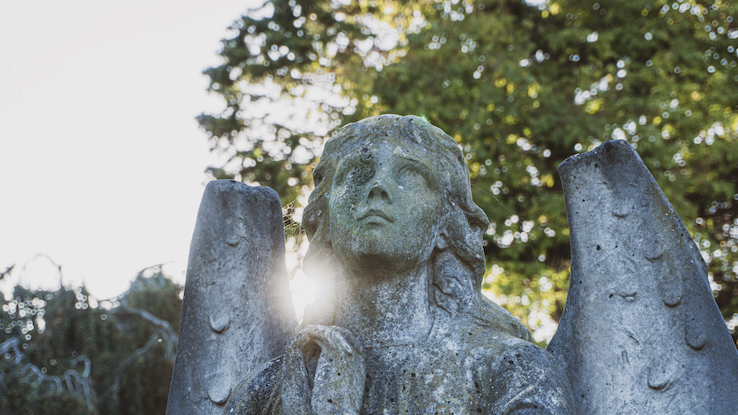Poems That You Have to Read Again

When you lose a loved one, it's important to accolade their retentiveness in a style that holds meaning for you lot. You might choose to suit a memorial service that displays your respect for their life, shows how much they meant to you and helps you and others process your grief in a purposeful way. Some people choose to write their own eulogies to read during the service, while others prefer to read a poignant verse form that expresses their feelings in a heartfelt style or that helps them find the words they're having difficulty conveying. If you're searching for a poem to read at your loved one's funeral, consider one of these five thoughtful options, each penned by a well-known poet.
"Recollect" by Christina Rossetti
Born in London to an Italian poet in exile, Christina Rossetti wrote some of the virtually famous poems of the Victorian era. Many of her works focused on the topics of death and sadness, and one of her most notable works is "Remember," which is often read at funerals and memorial services. The poem gives voice to the person who has passed away and asks mourners to remember her fondly. Even so, it besides gives the mourners permission to forget her in the hereafter, as the author wants her loved ones to be happy rather than wallow in sadness after her death.

An excerpt of this poem reads:
"Yet if you should forget me for a while
And afterwards remember, do not grieve:
For if the darkness and corruption go out
A vestige of the thoughts that once I had,
Meliorate past far you lot should forget and grinning
Than that you should remember and be lamentable."
Observe the total version of "Remember" here.
"Cypher Aureate Can Stay" by Robert Frost
Robert Frost grew up in New England and wrote at length about the region. His most famous works relate to nature, specifically human being's relationship with nature and the significant of life. That sentiment is axiomatic in "Nothing Gilt Can Stay," which uses the life cycle of a flower as a metaphor for human decease. Frost'due south theme is that nada lasts forever, no matter how beautiful or "gold" it is. He compares expiry to the ruin of the Garden of Eden and the ending of a solar day. At eight lines, the poem is short, only it relays a bulletin of credence of death'due south inevitability and capeesh of life'south beauty.

An extract of this poem reads:
"And so Eden sank to grief,
So dawn goes down to day.
Nothing gilt tin can stay."
Find the full version of "Zilch Aureate Can Stay" here.
"Crossing the Bar" by Alfred Lord Tennyson
Alfred Lord Tennyson was one of the most famous poets in the Victorian historic period. He grew upward in a troubled household in England and often turned to his poetry as a way to escape his turbulent life. Throughout the years, he wrote eulogies in the class of poems for lost friends and family members. "Crossing the Bar" is a poem he wrote after the death of his son, Lionel, during a time that left the poet searching for the meaning of life through faith and spirituality. He wrote this detail poem while on a boat, and it compares death to going out to sea. It likewise mentions meeting the "Pilot's" face later on crossing the bar, which may exist a metaphor for God or a higher beingness.

An excerpt of this poem reads:
"Twilight and evening bong,
And afterward that the nighttime!
And may there be no sadness of cheerio,
When I embark;
For tho' from out our bourne of Time and Place
The overflowing may bear me far,
I promise to see my Pilot confront to confront
When I take crost the bar."
Discover the total version of "Crossing the Bar" here.
"Because I could not stop for Expiry (479)" by Emily Dickinson
Massachusetts native Emily Dickinson is peradventure one of the about famous American poets in history, and her poem "Because I could not stop for Death (479)" is ane of her more than notable works. Often read at funerals and memorial services, the poem depicts death every bit a company to the person'southward dwelling who takes the author away in a carriage. Death and the author take a ride through town, passing fields and schools earlier coming to a terminate at her last destination. The poem talks of the sun setting, a business firm that seems to exist swelling from the basis and how eternity feels like but a 24-hour interval.

An extract of this verse form reads:
"Because I could not finish for Expiry –
He kindly stopped for me –
The Carriage held but but Ourselves –
And Immortality."
Observe the full version of "Considering I could non stop for Decease" here.
"A Child Said, What Is the Grass?" by Walt Whitman
Walt Whitman grew up in Brooklyn and is also i of the most famous poets in the history of the U.S. Much of his work focuses on nature and honey, and he manages to find beauty in almost every situation, including decease. That'south the theme of the poem "A Kid Said, What Is the Grass?" It begins with a immature kid request the author "What is grass?" He goes on to call up well-nigh the various answers he tin give the child, simply he's unhappy with all the answers. Finally, he wonders what has go of all the people who died in the past who are buried nether the grass, coming to the conclusion that the grass is proof they aren't actually expressionless. The verse form is a bit longer than the others on the listing, but it has an uplifting message for mourners by pointing out that death is not an end, simply a transition to a new chapter.

An extract of this poem reads:
"What practice you think has become of the young and former men?
And what do you call back has go of the women and children?
They are live and well somewhere,
The smallest sprout shows at that place is really no death."
Find the full version of "A Child Said, What Is the Grass" here.
Source: https://www.questionsanswered.net/lifestyle/5-poems-to-read-at-a-memorial-service?utm_content=params%3Ao%3D740012%26ad%3DdirN%26qo%3DserpIndex
0 Response to "Poems That You Have to Read Again"
Publicar un comentario